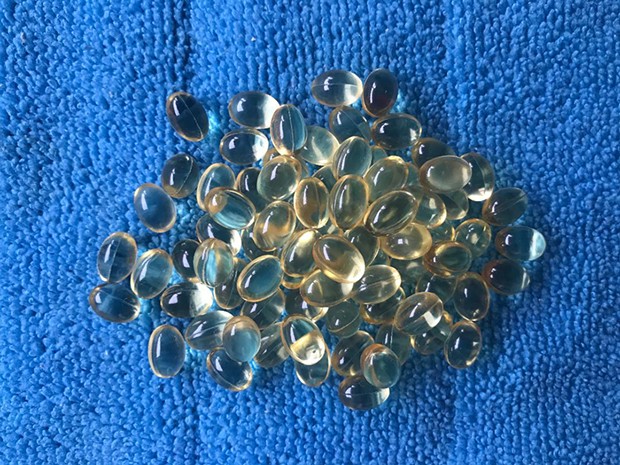[
{
"name": "Top Stories Video Pair",
"insertPoint": "7",
"component": "17087298",
"parentWrapperClass": "fdn-ads-inline-content-block",
"requiredCountToDisplay": "1"
}
]
It's a conundrum: Ultraviolet B radiation from the sun is both the best source of vitamin D — the "sunshine vitamin" — and the the major cause of skin cancer. Get enough sun-mediated vitamin D and your're courting melonoma; too little and the rest of your body will suffer. Vitamin D facilitates absorption of bone-building calcium, magnesium and phosphate, and a deficiency leads to osteoporosis (brittle bones) and osteomalacia (soft bones). Low vitamin D has also been linked to muscle weakness, heart disease, dementia, Alzheimer's and Parkinson's disease. What to do? Check out any medical website and you'll probably find the "sun, sardines or supplements" options.
Sun: Most of us suffer from "environmental mismatch," the discrepancy between the environment in which our ancestors evolved and where we now live. Not just our environment, our behavior has changed, too: We slather on sunscreen and wear sun-blocking clothes. (Mothers in some religious groups wear long garments with hoods and veils, leading to a deficiency of vitamin D in their breastmilk.) Here in the U.S., 45 percent of 55 to 64 year olds are vitamin D deficient.
Sardines: They and other fatty fish, such as salmon, tuna, mackerel, are rich in vitamin D. We also now have vitamin D fortified foods, such as milk and orange juice.
Supplements: Between 31 and 39 percent (depending on the age range) of older (60+) Americans take vitamin D supplements, either alone or as part of a multivitamin routine.
So, you might reason, if I have a vitamin D deficiency and I'm not about to start sunbathing nude year-round or eating a lot of fish, I should be taking a supplement, right? Depends who you ask. First off, there's no agreement what constitutes "deficiency." It's somewhere around a blood level 30 nanograms per millimeter as measured by what's known as the "25(OH)D" test but different health groups have different recommendations. Secondly, there's no consensus about the value of taking supplements. This from the Cleveland Clinic: "A University of Cambridge 2014 study found no evidence that vitamin D supplements reduced overall mortality." But if you read the referenced study, you find: "Supplementation with vitamin D3 significantly reduces overall mortality among older adults." From another reputable medical website: "Experts have recommended that postmenopausal women take calcium and vitamin D supplements to prevent osteoporosis," versus "vitamin D supplements had little effect on bone density."
This sort of confusion — rife among medical websites — extends to the recommended daily amount of supplemental vitamin D3 (as opposed to vitamin D2, which your body can't absorb as well). The Institute of Medicine (IOM) recommends a daily allowance of 600 international units (IU) for people up to age 70 and 800 IU for those 70+. But virtually every site I consulted for this article recommended higher levels. The American Association of Clinical Endocrinologists, for instance, says that we need 1,000 to 2,000 IU per day just to maintain our 25(OH)D level above 30 nanograms per millimeter. Which is still well below the IOM's 4,000 upper safe limit. (Beyond that and you risk kidney stones and other unsavory problems.)
Today, vitamin D screening during a blood test analysis isn't routine, unlike, for instance, cholesterol. Apparently the U.S. Preventive Services Task Force, which makes these recommendations, doesn't consider it that important. Chances are, your doctor will only check your 25(OH)D level if you complain of fatigue or aching muscles or bones. So maybe it's not worth getting too anxious about all this. Me, I'll take my one-a-day vitamin D3 supplement and maybe ask my doctor her advice. Probably not though. For 2 cents a day, what's the downside?
Barry Evans ([email protected]) isn't a physician (duh). Just because he isn't talking to his doctor about vitamin D doesn't mean you shouldn't.
Speaking of...
-

Radioactive
Sep 5, 2019 -

Living with Cancer
Aug 29, 2019 -

Cancer, Part 2: Turtles, Birds and Rabbits
Jan 24, 2019 - More »
Comments (3)
Showing 1-3 of 3
more from the author
-
A Brief History of Dildos
- Apr 11, 2024
-
Eclipse!
- Mar 28, 2024
-
The Little Drone that Could
- Mar 14, 2024
- More »
Latest in Field Notes
Readers also liked…
-
Trouble on the Line: The Reality Part 2
- Nov 3, 2022

































